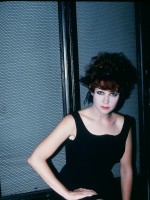Dietmar Post est un Réalisateur, Scénariste, Producteur, Assistant Director et Cinématographie Allemand né le 26 décembre 1962 à Espelkamp (Allemagne)
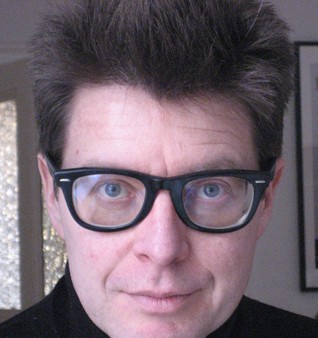
Dietmar Post (* December 26, 1962 in Germany) is a film director, producer and owner of a film and music label.
Critics have called Post and Palacios the German counterpart to the American Direct Cinema directors D. A. Pennebaker and Chris Hegedus.
In 2008 Dietmar Post and Lucia Palacios received the prestigious Adolf-Grimme Awards (The German TV Oscar).
Source : Wikidata
Dietmar Post

- Infos
- Photos
- Meilleurs films
- Famille
- Personnages
- Récompenses
Nom de naissance Dietmar Post
Nationalité Allemagne
Naissance 26 décembre 1962 (61 ans) à Espelkamp (Allemagne)
Nationalité Allemagne
Naissance 26 décembre 1962 (61 ans) à Espelkamp (Allemagne)
Biographie
Dietmar Post worked as an off set printer before studying Theatre and Film Studies and Spanish Language at Free University in Berlin and at Complutense University in Madrid. In 1995 he obtained his master's degree. Between 1995–2003 he lived and worked in New York. He attended film school at NYU, where he made his first short film, the award-winning Bowl of Oatmeal. His second short film Cloven Hoofed had its premiere at the Rotterdam Film Festival in 1998. Post assisted renowned documentary filmmakers Thomas Schadt (Wall Street), Reiner Holzemer (Walker Evans) and Lutz Dammbeck (The Net). In 1997 he founded with his partner Lucia Palacios the production company Play Loud! Productions, which since 2006 also functions as a film and music label. Their own films, such as, Reverend Billy & The Church of Stop Shopping (documentary film), monks - the transatlantic feedback and Klangbad: Avant-garde in the Meadows have been acclaimed world wide.Critics have called Post and Palacios the German counterpart to the American Direct Cinema directors D. A. Pennebaker and Chris Hegedus.
In 2008 Dietmar Post and Lucia Palacios received the prestigious Adolf-Grimme Awards (The German TV Oscar).
Le plus souvent avec
Filmographie de Dietmar Post (10 films)
Réalisateur
 , 1h10
, 1h10Réalisé par Dietmar Post
Thèmes La musique, Documentaire sur la musique, Documentaire sur une personnalité, Musique
 , 8minutes
, 8minutesRéalisé par Dietmar Post
Origine Etats-Unis
Genres Documentaire
Thèmes La musique, Documentaire sur la musique, Documentaire sur une personnalité, Musique

Réalisé par Dietmar Post
Genres Documentaire
Thèmes La musique, Documentaire sur la musique, Documentaire sur une personnalité, Musique
There are mainly two kinds of rock festivals: the usual ones and the adventurous-creative ones. The former present music, which everyone already knows. The others got their finger at the pulse of time and put their ear into niches and near boundary zones. They point out up-to-date trends, present upcoming musicians and bands, make new musical experiences and discoveries possible. The Klangbad festival at Scheer near Sigmaringen, South Germany, certainly belongs to this category and is the real festival insider's tip for open ears.

Réalisé par Dietmar Post
Origine Etats-Unis
Thèmes La musique, Documentaire sur la musique, Documentaire sur une personnalité, Musique
 , 1h40
, 1h40Réalisé par Dietmar Post
Origine Etats-Unis
Genres Documentaire
Thèmes La musique, Documentaire sur la musique, Documentaire sur une personnalité, Musique
Note72%





Jake Austen for Time Out described the film as follows: After the Beatles conquered the world, America responded with the Monkees, a friendlier version playing Brill Building hits. Inversely, in Germany, a pair of avant-garde geniuses (Walther Niemann and Karl-H. Remy) conceptualized the monks, a group of bizarre anti-Beatles who would write their own dark minimalist rock. The gifted band, a group of five Americans who had recently finished their U.S. military service at a German base, had honed its skills by playing up to 40 hours a week in the same beat clubs that provided the Beatles’ training. The musicians’ new managers dressed them in black, shaved their heads like monks, provided them with a series of manifestos, and coached them to reconfigure their band to feature tribal drumming, feedback and electric banjo. Somehow, this resulted in one of the greatest albums in rock history. Despite experimenting with minimalism, tension and antipop sensibilities (backup vocals are sung in creepy unison instead of sweet harmony), the record is danceable and joyous. One of the most fascinating aspects of the film is seeing the five contemporary monks discussing the history they had all buried upon returning to America in 1967, after the band’s dissolution. Larry Clark, the Chicago-bred R&B keyboardist, won’t allow himself to attach any significance to his work with the monks. Absurdly, of the five articulate interviewees, only guitarist and lead singer Gary Burger is willing to attribute political significance to the Vietnam lyrics in their theme song. With this lack of singular vision, it’s not surprising that the filmmakers framed their story by focusing on the conceptualists’ vision.

Réalisé par Dietmar Post
Origine Etats-Unis
Genres Documentaire
Thèmes Documentaire sur la politique, Politique
Note74%





Filmmakers Dietmar Post and Lucia Palacios have accompanied the Reverend and his troupe over the period of an entire year. The film follows the Reverend's "shopping interventions/actions" into cultural dead zones within the island of Manhattan such as Starbucks, Disney and the New York University construction site at the Edgar Allan Poe House.
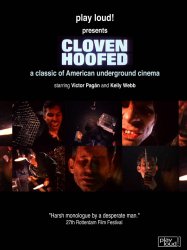
Cloven Hoofed (1998)
, 12minutesRéalisé par Dietmar Post
"Harsh theatrical monologue by a desperate man. Ray is a crack addict who has not scored for too long. Withdrawal symptoms cloud his paranoid mind. He sharpens his knife to take it out on his girlfriend who fled with his pipe and his crack. Sometimes his cruel and violent sexual fantasies are visualized, but in general the insane verbal ravings of the goaded Ray predominate." Written by Gertjan Zuilhof, Programmer, 27th Rotterdam Film Festival, Netherlands
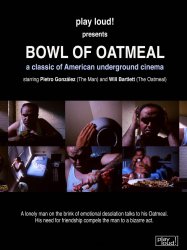
Bowl of Oatmeal (1996)
, 10minutesRéalisé par Dietmar Post
Origine Etats-Unis
Genres Drame
Note59%





A lonely man on the brink of emotional desolation talks to his Oatmeal.
Scénariste

Réalisé par Dietmar Post
Genres Documentaire
Thèmes La musique, Documentaire sur la musique, Documentaire sur une personnalité, Musique
There are mainly two kinds of rock festivals: the usual ones and the adventurous-creative ones. The former present music, which everyone already knows. The others got their finger at the pulse of time and put their ear into niches and near boundary zones. They point out up-to-date trends, present upcoming musicians and bands, make new musical experiences and discoveries possible. The Klangbad festival at Scheer near Sigmaringen, South Germany, certainly belongs to this category and is the real festival insider's tip for open ears.

Réalisé par Dietmar Post
Origine Etats-Unis
Thèmes La musique, Documentaire sur la musique, Documentaire sur une personnalité, Musique
 , 1h40
, 1h40Réalisé par Dietmar Post
Origine Etats-Unis
Genres Documentaire
Thèmes La musique, Documentaire sur la musique, Documentaire sur une personnalité, Musique
Rôle Ecrivain
Note72%





Jake Austen for Time Out described the film as follows: After the Beatles conquered the world, America responded with the Monkees, a friendlier version playing Brill Building hits. Inversely, in Germany, a pair of avant-garde geniuses (Walther Niemann and Karl-H. Remy) conceptualized the monks, a group of bizarre anti-Beatles who would write their own dark minimalist rock. The gifted band, a group of five Americans who had recently finished their U.S. military service at a German base, had honed its skills by playing up to 40 hours a week in the same beat clubs that provided the Beatles’ training. The musicians’ new managers dressed them in black, shaved their heads like monks, provided them with a series of manifestos, and coached them to reconfigure their band to feature tribal drumming, feedback and electric banjo. Somehow, this resulted in one of the greatest albums in rock history. Despite experimenting with minimalism, tension and antipop sensibilities (backup vocals are sung in creepy unison instead of sweet harmony), the record is danceable and joyous. One of the most fascinating aspects of the film is seeing the five contemporary monks discussing the history they had all buried upon returning to America in 1967, after the band’s dissolution. Larry Clark, the Chicago-bred R&B keyboardist, won’t allow himself to attach any significance to his work with the monks. Absurdly, of the five articulate interviewees, only guitarist and lead singer Gary Burger is willing to attribute political significance to the Vietnam lyrics in their theme song. With this lack of singular vision, it’s not surprising that the filmmakers framed their story by focusing on the conceptualists’ vision.
Producteur

Réalisé par Dietmar Post
Genres Documentaire
Thèmes La musique, Documentaire sur la musique, Documentaire sur une personnalité, Musique
Rôle Producteur
There are mainly two kinds of rock festivals: the usual ones and the adventurous-creative ones. The former present music, which everyone already knows. The others got their finger at the pulse of time and put their ear into niches and near boundary zones. They point out up-to-date trends, present upcoming musicians and bands, make new musical experiences and discoveries possible. The Klangbad festival at Scheer near Sigmaringen, South Germany, certainly belongs to this category and is the real festival insider's tip for open ears.

Réalisé par Dietmar Post
Origine Etats-Unis
Thèmes La musique, Documentaire sur la musique, Documentaire sur une personnalité, Musique
Rôle Producteur
 , 1h40
, 1h40Réalisé par Dietmar Post
Origine Etats-Unis
Genres Documentaire
Thèmes La musique, Documentaire sur la musique, Documentaire sur une personnalité, Musique
Rôle Producteur
Note72%





Jake Austen for Time Out described the film as follows: After the Beatles conquered the world, America responded with the Monkees, a friendlier version playing Brill Building hits. Inversely, in Germany, a pair of avant-garde geniuses (Walther Niemann and Karl-H. Remy) conceptualized the monks, a group of bizarre anti-Beatles who would write their own dark minimalist rock. The gifted band, a group of five Americans who had recently finished their U.S. military service at a German base, had honed its skills by playing up to 40 hours a week in the same beat clubs that provided the Beatles’ training. The musicians’ new managers dressed them in black, shaved their heads like monks, provided them with a series of manifestos, and coached them to reconfigure their band to feature tribal drumming, feedback and electric banjo. Somehow, this resulted in one of the greatest albums in rock history. Despite experimenting with minimalism, tension and antipop sensibilities (backup vocals are sung in creepy unison instead of sweet harmony), the record is danceable and joyous. One of the most fascinating aspects of the film is seeing the five contemporary monks discussing the history they had all buried upon returning to America in 1967, after the band’s dissolution. Larry Clark, the Chicago-bred R&B keyboardist, won’t allow himself to attach any significance to his work with the monks. Absurdly, of the five articulate interviewees, only guitarist and lead singer Gary Burger is willing to attribute political significance to the Vietnam lyrics in their theme song. With this lack of singular vision, it’s not surprising that the filmmakers framed their story by focusing on the conceptualists’ vision.
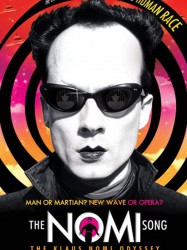
The Nomi Song (2005)
, 1h36Genres Documentaire, Musical
Thèmes La musique, Sexualité, Homosexualité, Documentaire sur l'homosexualité, Documentaire sur la musique, Documentaire sur une personnalité, Musique, LGBT, LGBT
Acteurs David Bowie, Ann Magnuson, Martin Sheen
Rôle Producteur exécutif
Note73%





 Connexion
Connexion

